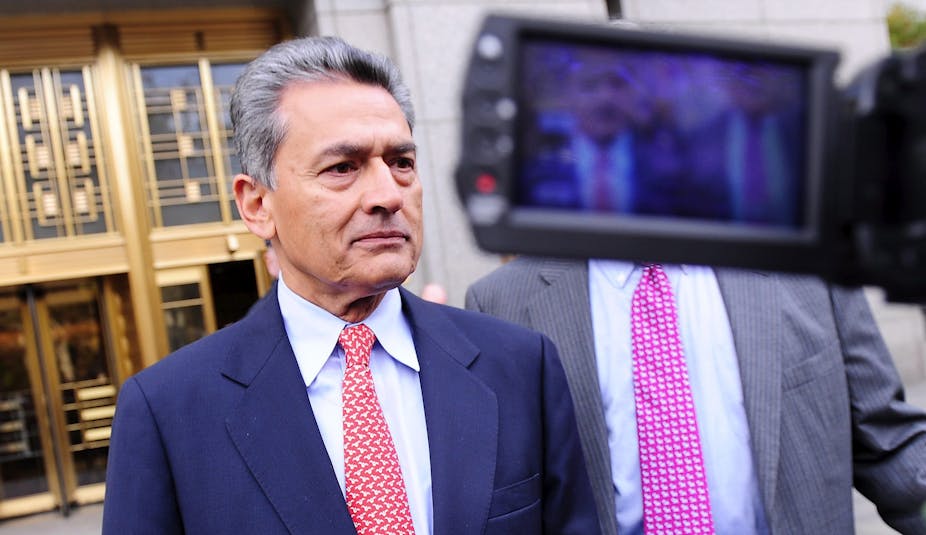The Department of Justice in the United States has significantly broadened the reach of its investigation into insider trading.
The charging of a former director of Goldman Sachs and Procter & Gamble, Rajat Gupta, with securities fraud is designed to send a clear message to Wall Street and the judiciary that the regulatory system is capable of ensuring warranted trust.
It suggests that reputation does not provide impunity from investigation. It also addresses ongoing public and judicial concern about public enforcement, which has focused on either securing settlements that do not involve admissions of liability or on the prosecution of low-level actors.
The accusation that Rajat Gupta breached directors duties and committed securities fraud in passing on confidential information to Raj Rajaratnam, the head of Galleon Investments, had been flagged in the latter’s insider trading trial earlier this year. Rajaratnam was convicted and sentenced to 11 years imprisonment.
No evidence has yet been proffered that Gupta profited from the circumstantial evidence that he provided confidential information in relation to investments in Goldman Sachs and quarterly earnings at Proctor & Gamble.
The reputational damage, however, is complete.
The charges, which he denies, provide a humiliating capstone to what had been a storied career. Rajat Gupta served as chief executive of the consultancy firm McKinsey & Co before retiring to the boardrooms of two of the most influential corporations in the United States.

According to the US Attorney for the Southern District, “Rajat Gupta was entrusted by some of the premier institutions of American business to sit inside their boardrooms, among their executives and directors, and receive their confidential information so that he could give advice and counsel for the benefit of their shareholders…He broke that trust and instead became the illegal eyes and ears in the boardroom for his friend and business associate, Raj Rajaratnam, who reaped enormous profits from Mr Gupta’s breach of duty.”
The Securities and Exchange Commission (SEC) simultaneously lodged a civil case. It cited what it claimed was evidence of an extensive and sophisticated insider trading network. As with the Southern District Attorney, the emphasis for the SEC in bringing the case was linked to the betrayal of trust.
When taking enforcement action, regulatory agencies need to balance the effect of conviction with the political costs associated with bringing complex and uncertain cases to trial.
Beyond the merits of an individual action, achieving wider demonstration effect requires changing both the content and context of the underpinning system of oversight. This requires two components.
First, the preparation of the case and its subsequent staging — including the critical initial presentation of the evidential base —needs to reconfigure media representations of what constitutes acceptable conduct. This applies despite the legal strength of the material claim. Trial strategies tend to focus on competing narratives. It is, therefore, essential to “own” the media agenda.
Second, the litigation needs to be capable of recalibrating — without credible dissension — the broader policy agenda. To be successful, therefore, prosecutorial strategies need to facilitate the positive framing of policy issues. This involves not only the regulator’s own conception of its interpretation of appropriate purpose and accountability, but also judicial and broader societal understandings. This coupling explains the emphasis on trust in both narratives.
The problem faced by the regulatory authorities, particularly the SEC, is that there is increasing scepticism that the enforcement agendas are fair, reasonable adequate or in the public interest.
The Federal Court judge, Jed Rakoff, who is responsible for hearing the Gupta case, is exceptionally sceptical of the SEC’s general approach. In a previous settlement reached by the SEC against Bank of America, he argued that it risked privileging “the façade of enforcement” in agreeing settlements that no not contain acceptance of wrongdoing.
Judge Rakoff refused to endorse the proposed settlement with Citigroup last week over litigation that it had engaged in deceptive and misleading conduct in a complex derivative transaction.
The charging of Gupta draws attention to the fact that the SEC recognises the limitations of previous strategies. If convicted, Wall Street has much to fear.

